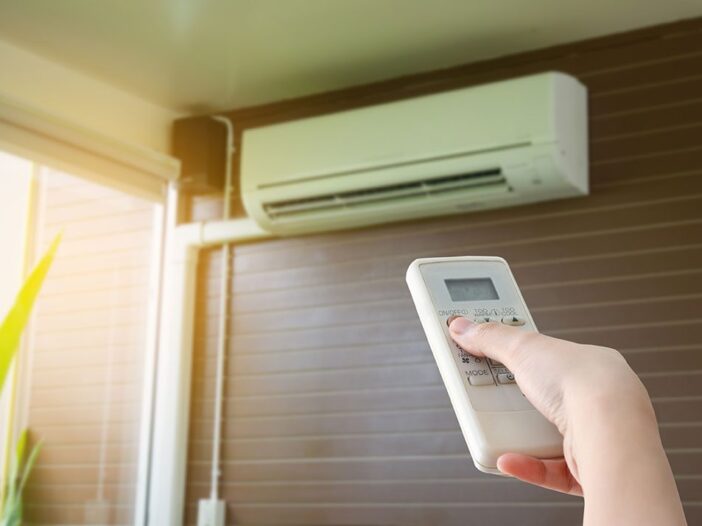
Heating With Ductless Heat Pumps (Podcast)
In this podcast, John Maher talks with Tim Schofield and Matt Tore of Jones Services. They explain how ductless heat pumps can heat a single room or your whole home. Then, they talk about the advantages of ductless heat pumps over other heating solutions.
John Maher: Hi, I’m John Maher. I’m here today with Tim Schofield and Matt Tore of Jones Services, a service company in Goshen, New York with a focus on Mitsubishi heating and cooling systems. Today we’re talking about heating with ductless heat pumps. Tim and Matt, welcome.
Tim Schofield: Hey John.
Matt Torre: Hey John. Thanks as always for having us.
Is a Heat Pump a Good Heating Solution for a Single Room?
John: Great to have you. So is a ductless heat pump or sometimes called a mini-split a good way to heat a single room in your home such as a bedroom or maybe a family room?
Matt: Yes, John, a single zone mini-split is a great way to add supplemental heating to a room that maybe was underserved with the original system in the house. So if that room struggled to make temperature on the coldest days of the year, we can put in a one-to-one unit to help to offset that. A lot of times also I find that single zone units are great for bonus rooms above a garage or maybe that addition that you added to the home that really wasn’t able to be tied into the original system.
And then the other place we use a lot of single zones is for that unfinished basement that we’re looking to turn into a finished basement that maybe wasn’t considered with the original system. Based on the application, there’s a lot of value that you can get from a single one-to-one unit attacking a primary room of choice. Again, whether that be an addition or an underserved room, we’ve done a lot of systems like that.
Heating a Home Addition With a Ductless Heat Pump
John: And when you’re talking about an addition like that, if you tried to heat that room with your existing heating system, that might not work, right? Because your heating system is designed for a certain square footage or a certain design of your home, and then it may not have the capacity to heat those extra rooms. Is that right?
Matt: Absolutely. I mean, if the system for your home was sized properly when it was put in, it probably doesn’t have the capacity to adequately heat that new space. Beyond that, you have the idea of how are we going to get that heat from that boiler or that furnace into that room. And that may require, again, tearing down some walls or getting into some levels of construction that really isn’t going to be necessary or isn’t going to be comfortable for the homeowner. So before you do an addition, that’s something that you’re going to want to speak to a professional about.
Can You Heat a Whole Home With a Ductless Heat Pump?
John: What about heating a whole home with a ductless heating system or air source heat pump? Can you do that?
Tim: Yeah, John. You definitely can. The system needs to be designed so that you can heat all of the square footage of the house and get the heat to all the right areas. Especially if you want to use it as a sole source of heat, it needs to be designed, so on that five degree or zero degree day, it’s still humming along and pumping the beat to use into the space.
But being that it’s an inverter system where the compressors and the fans, they ramp up and ramp down, it’s a much, much more comfortable and quieter heat being compared to a forced hot air furnace, which is just going to run at full speed or no speed, so when these inverters are running and they’re just humming along to keep the temperature maintained, you don’t get those drafts and those temperature variations when you hear your forced hot air system turn on and turn off. So it’s a great way to do the whole house when designed properly.
Do You Need a Unit in Every Room for Whole Home Heating?
John: Does a homeowner need to think about installing an indoor unit in every single room in order to heat their whole home, or are there systems that one indoor unit will heat several rooms? How does that work?
Tim: So that goes back to the design, John. If you were doing a ranch-style house and the bedrooms are on one side of the house, and then the living room, kitchen dining room is on the other side of the house, then you need to distribute your BTUs properly if you’re going to be using it as a permanent heating source, to make sure that you’re comfortable in all those areas. So if you’re going to have all your bedrooms together, maybe it’s three Mitsubishi wall units, and then each one has its own thermostat, then maybe on the other side, you may want to have an adapted unit and put a vent into the bathroom. So that’s where it’s very important to have a design professional really come up with a good evaluation of your home based on your expectation of how you want to use it.
Ductless Heat Pumps Versus Baseboard Heat
John: If I have baseboard electric heat in my home now, what are some of the advantages of a ductless heat pump over those old baseboard heaters?
Matt: Well, there’s a number of advantages. I’ll start with the most obvious one, which is there’s going to be a pretty tremendous amount of savings in terms of your utility cost to operate. Baseboard electric, unfortunately, is one of the least efficient ways to heat a home. We have a number of customers that we’ve converted from electric baseboard to a heat pump solution, be it either ducted or ductless and they’ve seen significant savings in their utility bills during the heating season.
The other advantage is, those heating elements are a little bit unsightly. They can be hot and at times you want to keep things away from them because they are potentially at worst case, a potential risk for fire. So I think outside of the obvious economic savings, just the overall safety and the look of them can easily be improved with the heat pump.
John: Can they actually be dangerous especially with kids who are crawling around on the floor and maybe touching those baseboard heaters or-
Matt: Yeah. I don’t know if you’ve ever actually stuck your hand inside of one of those, but the outside surfaces of those get pretty hot and those inside elements will most definitely burn you. So, yeah, I think there’s obviously, if you do have little kids in the house like I do, they’re very exploratory and they like to stick things in places they shouldn’t. But be it their hand or a piece of tissue, I wouldn’t want either of them going inside one of those four mounted electric units.
Ductless Heat Pump Versus Traditional Heating Systems
John: All right. What are some of the advantages of a ductless heat pump system over a traditional heating system like gas or oil with a furnace or a boiler?
Tim: Yeah, John, good question. One of the biggest advantages is waste. So a traditional system that connects to a chimney like a oil boiler or a gas furnace is when that flame comes on to make the heat for the house, the chimney works by taking that exhaust and drafting it up the chimney. So when you think about that, you’re paying to make the flame then the chimney is sucking a lot of it out, sometimes as much as 20% or 30%.
So that’s 20 to 30 cents on every dollar you spend on the fuel going up the chimney compared to the ductless heat pumps, where it’s directly putting the BTUs right into the house without any combustion loss. So there’s a huge savings there, which I’ll go back to tie it in. That’s why New York State is offering these rebates to try to help people reduce their operational costs of the house and be more energy efficient for the environment. And at the end of the day, the homeowner should be a much more comfortable person with a Mitsubishi heat pump.
John: Right. So you can be more comfortable in your home and feel good about having a green heating system in your home as well.
Tim: Yeah. And the big elephant in the room in New York here right now is fuel oil. And the cost of a gallon of fuel oil is just out of control. So if you could use your heat pump, offset that cost, you’re going to start paying back your heat pump very quickly.
To Learn More, Contact Jones Services
John: All right. Well, that’s really great information guys. Matt and Tim, thanks again for speaking with me today.
Matt: Thanks, John.
Tim: Hey John. Thanks.
John: And for more information, you can visit the website at jonesservices.com or call (845) 294-1010.

